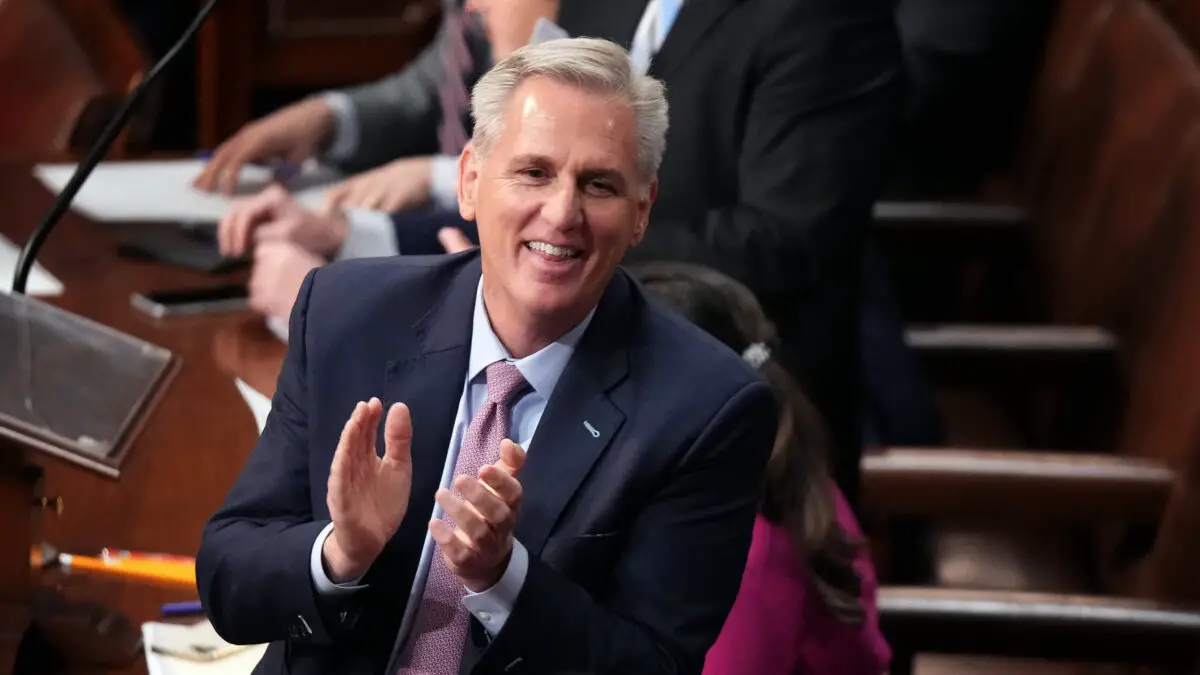It took 15 rounds of voting, the highest number of rounds on a Speaker of the House election since 1859, but Rep. Kevin McCarthy finally won a majority of support.
It was thought that McCarthy would have victory in the 14th round that wrapped up late in the 10 o’clock hour on the east coast. That didn’t quite happen as McCarthy came up one vote short.
The evening was filled with scenes like this with McCarthy directly confronting Gaetz during the 14th round:
Kevin McCarthy confronts Matt Gaetz during 14th House Speaker vote. #118thCongress pic.twitter.com/nMa9bm0KSN
— CSPAN (@cspan) January 7, 2023
For a short time, the House looked on the verge of adjourning until Monday when something changed in the math. After some cajoling and rampant discussion on the House floor, a 15th round of voting was undertaken which finally gave McCarthy a long-fought victory.
Boebert, Biggs, Crane, Good, and Gaetz became the “present” bloc rather than specifically voting against McCarthy.
By voting “present”, @RepAndyBiggsAZ @RepBoebert @mattgaetz and @EliCraneAZ will hand Kevin McCarthy the Speaker’s gavel on the 15th round of voting. Their present votes lowers the number of votes McCarthy needed to 216, the number of votes he received the last round.
— Emily A. ?? (@emzorbit) January 7, 2023
What did McCarthy concede in order to break the damn and coral the necessary number of votes? The actual details of the deal will wind up being beneficial to the American people and beneficial to restoring some regular order in Congress.
From gathering details all week, CNN compiled a list of some key demands that McCarthy agreed to:
- Any member can call for a motion to vacate the speaker’s chair – this is significant because it would make it much easier than it is currently to trigger what is effectively a no confidence vote in the speaker.
- A McCarthy-aligned super PAC agreed to not play in open Republican primaries in safe seats
- The House will hold votes on key conservative bills, including a balanced budget amendment, congressional term limits and border security
- Efforts to raise the nation’s debt ceiling must be paired with spending cuts. This could become a major issue in the future when it is time to raise the debt limit to avoid a catastrophic default because Democrats in the Senate and the White House would likely oppose demands for spending cuts
- Move 12 appropriations bills individually. Instead of passing separate bills to fund government operations, Congress frequently passes a massive year-end spending package known as an “omnibus” that rolls everything into one bill.
- More Freedom Caucus representation on committees, including the powerful House Rules Committee
Cap discretionary spending at fiscal 2022 levels, which would amount to lower levels for defense and domestic programs - Seventy-two hours to review bills before they come to floor
- Give members the ability to offer more amendments on the House floor
- Create an investigative committee to probe the “weaponization” of the federal government
- Restore the Holman rule, which can be used to reduce the salary of government officials
There was a lot of over-the-top complaining from the pundit class about the country being “hostage” to a handful of “Never Kevin” Republicans. In the end, after a few days, the time spent seems more than worth it.
It’s worth asking why there was such a concern for spending a few days demanding better rules and function of the U.S. House of Representatives. After all, Congress has one of the worst approval ratings among all branches of government. Several of these anti-McCarthy House members, newly elected and recently re-elected, are coming into power with an agenda and a mandate from their voters to stand up for conservative principles and work to restore power to the American people.
Breaking news:
After 15 rounds of voting over four days, California Republican Kevin McCarthy has been elected Speaker of the U.S. House.
This was the longest speaker election since 1859 and the fifth longest in U.S. history.
What a week.
— Taylor Popielarz (@TaylorPopielarz) January 7, 2023
The question now is whether Kevin McCarthy will hold to his end of the bargain and how the new Republican majority will work together moving forward.
Donate Now to Support Election Central
- Help defend independent journalism
- Directly support this website and our efforts
